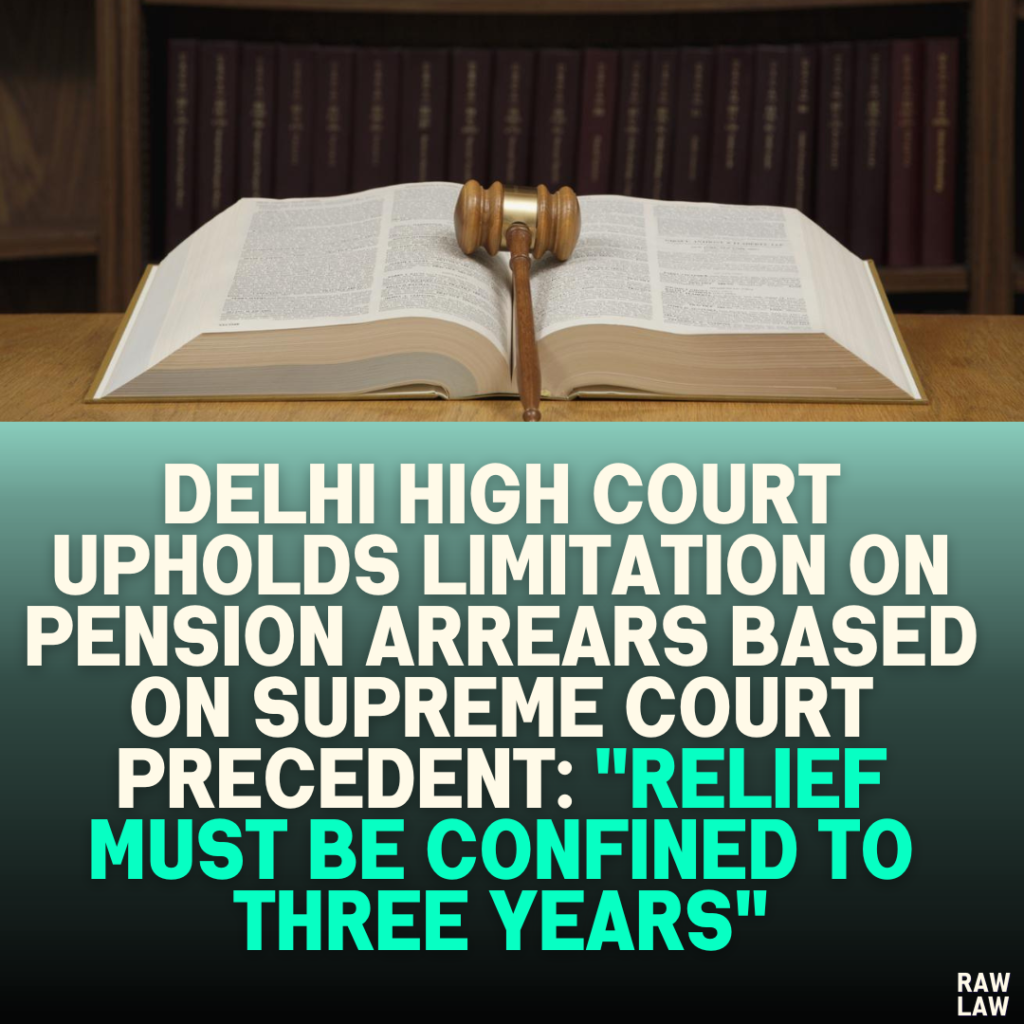Court’s Decision
The Delhi High Court dismissed the petitioner’s writ petition, confirming the Armed Forces Tribunal’s (AFT) order that restricted the arrears of revised pension to a period of three years prior to the filing of the original application. The court upheld the AFT’s reliance on the Supreme Court’s precedent in Union of India v. Tarsem Singh (2008) 8 SCC 648, which limits pension arrears in cases involving delayed claims.
Facts of the Case
- The petitioner, a retired Junior Warrant Officer (JWO) of the Indian Air Force, served from February 2, 1982, to February 28, 2002.
- Upon retirement, his pension was determined without considering his promotion to JWO. The reason provided was that he had not completed 10 months of service in the JWO rank, a requirement for pensionary benefits.
- Aggrieved by this, the petitioner filed an Original Application (OA) before the AFT on August 8, 2024, more than 22 years after his discharge.
- The AFT condoned the delay of 8,201 days but limited the relief for arrears to a period of three years before the OA filing date. This was based on the Supreme Court’s judgment in Tarsem Singh.
Issues Before the Court
- Delay: Should the delay in filing the pension claim (22 years) be condoned?
- Arrears: Should the petitioner be entitled to arrears beyond the three-year limitation prescribed in Tarsem Singh?
Petitioner’s Arguments
- The petitioner claimed that his pension was wrongly calculated and did not account for his promotion to JWO.
- He argued that the delay in filing his claim should not disentitle him from receiving the arrears due since his discharge.
Respondent’s Arguments
- The respondents emphasized that the claim was time-barred, being filed more than two decades after the petitioner’s retirement.
- They argued that arrears, if awarded, should be limited to three years before the filing of the OA, in line with the Tarsem Singh judgment.
Analysis of the Law
- Delay in Pension Cases: The Supreme Court in Tarsem Singh had clarified that delays in pension-related matters could be condoned to allow a hearing on merits. However, this relaxation is subject to certain conditions, particularly concerning arrears.
- Limitation on Arrears: Tarsem Singh established that arrears for pension claims could not extend beyond three years from the date of the writ petition or demand. This prevents inequitable financial burdens on the state arising from stale claims.
- The Delhi High Court followed this reasoning, noting that the petitioner’s delay had been condoned, but arrears relief was restricted to the period prescribed in Tarsem Singh.
Precedent Analysis
The judgment in Tarsem Singh was pivotal in this case. Key excerpts from the Supreme Court judgment include:
“The relief relating to arrears should only extend to three years before the date of filing or demand, whichever is lesser.”
This principle ensures a balance between the state’s financial liabilities and the claimant’s rights. The AFT and the Delhi High Court applied this precedent to restrict arrears in the petitioner’s case.
Court’s Reasoning
- The court found no fault in the AFT’s application of Tarsem Singh. The AFT had judiciously condoned the petitioner’s delay but confined arrears relief to three years.
- The delay of 22 years was significant, and while it was condoned, it did not justify granting arrears beyond the prescribed limitation period.
- The High Court affirmed that the principle in Tarsem Singh serves as a guide for such cases, ensuring fairness without excessive financial burden on the state.
Conclusion
The High Court dismissed the writ petition, holding that:
- The petitioner’s claim for revised pension was justified.
- The arrears, however, could only be awarded for three years prior to the filing of the OA, as per Tarsem Singh.
Implications
- For Pension Claimants: This judgment reiterates that while pension claims are subject to relaxed limitations, the relief for arrears remains restricted. Claimants must act promptly to secure their full entitlements.
- For Judicial Precedent: The case underscores the continued applicability of Tarsem Singh as a controlling precedent in pension-related disputes.
- For State Authorities: It protects the state from excessive financial liabilities arising from delayed claims while ensuring fairness to claimants.
